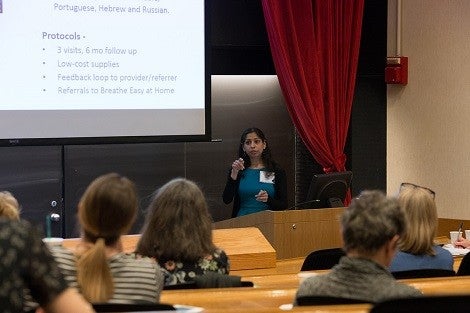May 9, 2018 — Asthma and obesity can go hand-in-hand, particularly in lower-income urban neighborhoods where residents face multiple health challenges such as exposure to traffic pollution and limited access to healthy food.
Inspired by concerns expressed by residents of Boston’s Dorchester neighborhood—where rates of both asthma and obesity are high—researchers from the Community Outreach and Engagement Core of the Harvard NIEHS-Center for Environmental Health (COEC) organized a workshop to discuss asthma and obesity prevention and care. It was held May 2, 2018 at Harvard T.H. Chan School of Public Health.
The COEC is working to raise awareness around asthma and obesity in Dorchester, and is also engaged in health and wellness educational activities in the community. Their efforts include working with residents to collect air and noise pollution data to support expansion of the Fairmount Greenway, a biking and walking trail that runs through Dorchester.
Center Director Doug Dockery, John L. Loeb and Frances Lehman Loeb Research Professor of Environmental Epidemiology, said that researchers at the Center, which is funded by the National Institute of Environmental Health Sciences, take pride in their mandate to engage with the community. They work to understand and alleviate potentially harmful environmental exposures such as traffic pollution, chemicals used to treat furniture and in cleaning products, and household pests, by learning from the residents who live with them, he said.
Two speakers from the Boston Public Health Commission—Anjali Nath, director of asthma prevention and control, and Sonia Carter, nutrition and wellness program manager—shared maps of asthma and obesity prevalence in Boston. Both conditions are high in the city’s lower-income neighborhoods. Dorchester, for example, has much higher rates than the city overall of asthma (18% vs. 11%) and obesity (31% vs. 21%).
Traci Brown, community liaison and research assistant in the School’s Department of Environmental Health, noted that an early paper on the asthma and obesity connection was published by Harvard Chan researchers nearly 20 years ago, using data from the long-running Nurses’ Health Study. Now, research by Stephanie Shore, senior lecturer on physiology, and others affiliated with the Harvard NIEHS Center is filling in the picture.
People with obesity are 92% more likely to develop asthma than lean individuals, and people with severe asthma are more likely to have obesity, according to researchers from the Center. Factors that may influence this connection include the pressure of excess weight on the lungs, alterations to the immune system caused by obesity, and the diets babies are exposed to in the womb and during infancy.
People with asthma who also have obesity are less responsive to controller medication and have increased hospital visits due to asthma. They can also suffer increased respiratory responses to air pollutants and other asthmatic triggers.
Ann Backus, Community Engagement Core director, told the audience of health care providers and public health practitioners that they will play an important role in helping the program move forward to the next stage of its work. Participants broke into groups to discuss how to disseminate information through channels including community health workers, health care providers, and social media, and took a survey evaluating the Center’s public information materials on the asthma and obesity connection.
Photo: Sarah Sholes
